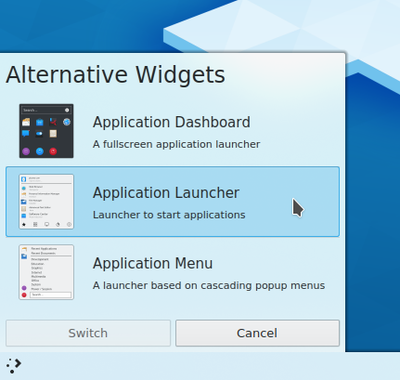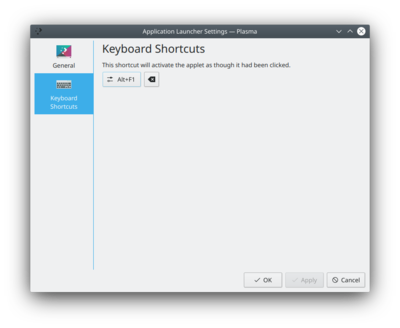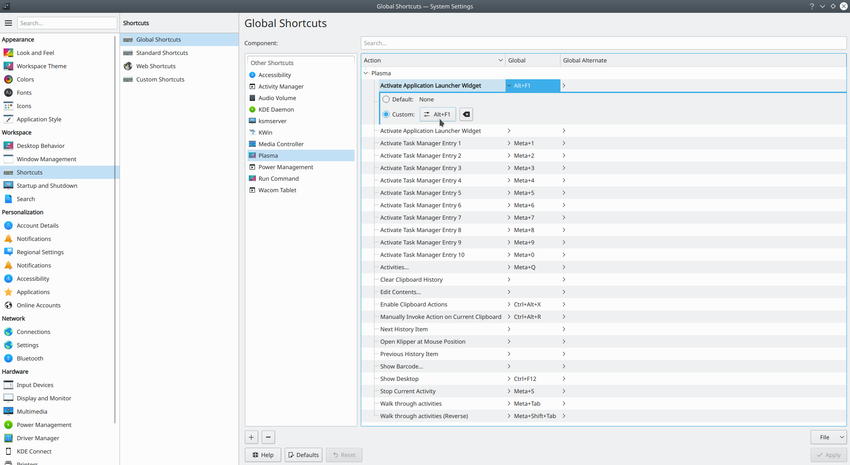Plasma application launchers: Difference between revisions
Fredtantini (talk | contribs) m typo |
Marked this version for translation |
||
| (44 intermediate revisions by 9 users not shown) | |||
| Line 1: | Line 1: | ||
<languages /> | <languages /> | ||
<translate> | <translate> | ||
== List of alternative start menus == <!--T:46--> | |||
<!--T:37--> | <!--T:37--> | ||
There are alternative "start menu" style Plasma application launchers in the KDE platform, including:</translate> | There are alternative "start menu" style Plasma application launchers in the KDE platform, including:</translate> | ||
| Line 6: | Line 9: | ||
|- | |- | ||
|<imagemap> | |<imagemap> | ||
Image: | Image:KickoffLogo.png|48px | ||
default <translate><!--T:14--> | default <translate><!--T:14--> | ||
[[Special:myLanguage/Plasma/Kickoff| | [[Special:myLanguage/Plasma/Kickoff|Application Launcher]]</translate> | ||
desc none | desc none | ||
</imagemap>||'''<translate><!--T:15--> | </imagemap>||'''<translate><!--T:15--> | ||
[[Special:myLanguage/Plasma/Kickoff| | [[Special:myLanguage/Plasma/Kickoff|Application Launcher]]</translate>''' | ||
:<translate><!--T:16--> | :<translate><!--T:16--> | ||
The default application launcher that provides a click-through interface for finding and launching applications. Kickoff has a search facility, allowing you to type the name of the application or its description to find it.</translate> | The default application launcher that provides a click-through interface for finding and launching applications. Kickoff has a search facility, allowing you to type the name of the application or its description to find it.</translate> | ||
|- | |- | ||
|<imagemap> | |<imagemap> | ||
Image: | Image:Application_dashboard_logo.png|48px | ||
default <translate><!--T: | default <translate> | ||
[[Special:myLanguage/ | <!--T:40--> | ||
[[Special:myLanguage/Plasma/Application Dashboard|Application Dashboard]]</translate> | |||
desc none | desc none | ||
</imagemap>||'''<translate><!--T: | </imagemap>||'''<translate> | ||
[[Special:myLanguage/ | <!--T:41--> | ||
:<translate><!--T: | [[Special:myLanguage/Plasma/Application Dashboard|Application Dashboard]]</translate>''' | ||
:<translate> | |||
<!--T:42--> | |||
Application Dashboard is a fullscreen launcher with content applications sorted categories.</translate> | |||
|- | |- | ||
| | |<imagemap>Image:KickerLogo.png|48px </imagemap> | ||
||'''<translate><!--T:35--> | ||'''<translate><!--T:35--> | ||
[[Special:myLanguage/Plasma/ | [[Special:myLanguage/Plasma/Kicker|Application Menu]]</translate>''' | ||
:<translate><!--T:36--> | :<translate><!--T:36--> | ||
This speedy and intuitive application launcher provides a classical hierarchical menu that is easily customized to give quick access to various useful applications and services.</translate> | |||
|- | |||
|<imagemap><translate> | |||
<!--T:62--> | |||
Image:Excalibur_Logo.png|48px | |||
default [[Special:myLanguage/Plasma/Excalibur]]</translate> | |||
desc none | |||
</imagemap><translate> | |||
<!--T:63--> | |||
||'''[[Special:myLanguage/Plasma/Excalibur|Excalibur]]''' | |||
:Excalibur is a simple application launcher with two columns and a search bar on top and a session control (logout, restart, shutdown) on the bottom.</translate> | |||
|- | |||
|<imagemap><translate> | |||
<!--T:64--> | |||
Image:Tiled Menu_Logo.png|48px | |||
default [[Special:myLanguage/Plasma/Tiled Menu]]</translate> | |||
desc none | |||
</imagemap><translate> | |||
<!--T:65--> | |||
||'''[[Special:myLanguage/Plasma/Tiled Menu|Tiled Menu]]''' | |||
:This is a "Windows 10"-style application menu that allows you to use tiles similar to the way it is done in Windows 10.</translate> | |||
|- | |||
|<imagemap>Image:Plasma.png|48px </imagemap> | |||
||'''<translate> | |||
<!--T:45--> | |||
[[Special:myLanguage/KRunner|KRunner]]</translate>''' | |||
:<translate> | |||
<!--T:38--> | |||
There is also [[Special:myLanguage/KRunner|KRunner]], which replaces the "run command" dialog, blurs the lines between task manager, desktop search, application launcher and command executor and provides a quick way to run applications or open documents among other things.</translate> | |||
|} | |} | ||
<translate> | <translate> | ||
<!--T: | |||
< | <!--T:60--> | ||
The KDE 4 application menus [[Special:myLanguage/Lancelot|Lancelot]]<ref>[https://cgit.kde.org/kdeplasma-addons.git/commit/?id=5a793c8ca9ba70cf26d572a17cd353491780901a Lancelot removed from plasmaaddons]</ref> and [[Special:myLanguage/Homerun|Homerun]]<ref>[https://github.com/KDE/homerun/commits/master Homerun source code not updated since 2014]</ref> are now outdated. However, '''Lancelot''' can be replaced by the similar style '''[[Special:myLanguage/Plasma/Excalibur|Excalibur]]''' and '''Homerun''' can be replaced by the similar style [[Special:myLanguage/Plasma/Application Dashboard|Application Dashboard]]. | |||
</translate><span id="How to change the application launcher"></span> <translate> | |||
== How to change the application launcher == <!--T:47--> | |||
<!--T:48--> | |||
To change the application launcher, right click on your current launcher and select <menuchoice>Alternatives…</menuchoice> | |||
<!--T:49--> | |||
Next, choose the launcher you want to use. | |||
<!--T:66--> | |||
{{Warning|Some settings of the currently used launcher might be reset to defaults when switching back}} | |||
<!--T:50--> | |||
[[File:LauncherAlternatives.png|400px|center]] | |||
<!--T:61--> | |||
In case the desired application launcher is not in the list, you need to install it first. You may do that by using '''[[Special:myLanguage/Discover|Discover]]''' or search for your launcher on the [https://store.kde.org/browse/cat/398/order/latest/ KDE Store]. At the ''KDE Store'' you will also find several other application launchers to be tested. | |||
== How do I change which key opens the application launcher? == <!--T:51--> | |||
<!--T:52--> | |||
It's possible to do that in two ways: you may right click on your current launcher and select <menuchoice>Configure Application Launcher…</menuchoice>, selecting the tab <menuchoice>Keyboard Shortcuts</menuchoice>, clicking on the button and then typing the combination you want to use as keyboard shortcut. | |||
<!--T:53--> | |||
[[File:LauncherKeyboardShortcut.png|400px|center]] | |||
<!--T:54--> | |||
You can also use {{Menu|System Settings|Shortcuts|Global Shortcuts|Plasma|Activate Application Launcher Widget}}. | |||
<!--T:55--> | |||
[[File:LauncherShortcutSettings.png|850px|center]] | |||
<!--T:56--> | |||
And if you ever want to restore the default Meta key, you can use the combination <keycap>Alt+F1</keycap>, which serves this exact purpose. | |||
== I can't bind the Meta key to open the Application Launcher anymore! == <!--T:57--> | |||
<!--T:58--> | |||
This issue may occur because of the way '''KWin''' binds keys. Please refer to [[Special:myLanguage/Plasma/Tips#Windows.2FMeta_Key|this section]]. | |||
== References == <!--T:59--> | |||
<references /> | |||
<!--T:39--> | <!--T:39--> | ||
[[Category:Desktop]] | [[Category:Desktop]] | ||
[[Category:Help]] | |||
</translate> | </translate> | ||
[[Category:Needs work]] | |||
Latest revision as of 06:00, 7 December 2021
There are alternative "start menu" style Plasma application launchers in the KDE platform, including:
Application Launcher
| |
Application Dashboard
| |
Application Menu
| |
Excalibur
| |
Tiled Menu
| |
KRunner
|
The KDE 4 application menus Lancelot[1] and Homerun[2] are now outdated. However, Lancelot can be replaced by the similar style Excalibur and Homerun can be replaced by the similar style Application Dashboard.
How to change the application launcher
To change the application launcher, right click on your current launcher and select
Next, choose the launcher you want to use.

In case the desired application launcher is not in the list, you need to install it first. You may do that by using Discover or search for your launcher on the KDE Store. At the KDE Store you will also find several other application launchers to be tested.
How do I change which key opens the application launcher?
It's possible to do that in two ways: you may right click on your current launcher and select , selecting the tab , clicking on the button and then typing the combination you want to use as keyboard shortcut.

You can also use → → → → .

And if you ever want to restore the default Meta key, you can use the combination Alt+F1, which serves this exact purpose.
I can't bind the Meta key to open the Application Launcher anymore!
This issue may occur because of the way KWin binds keys. Please refer to this section.







